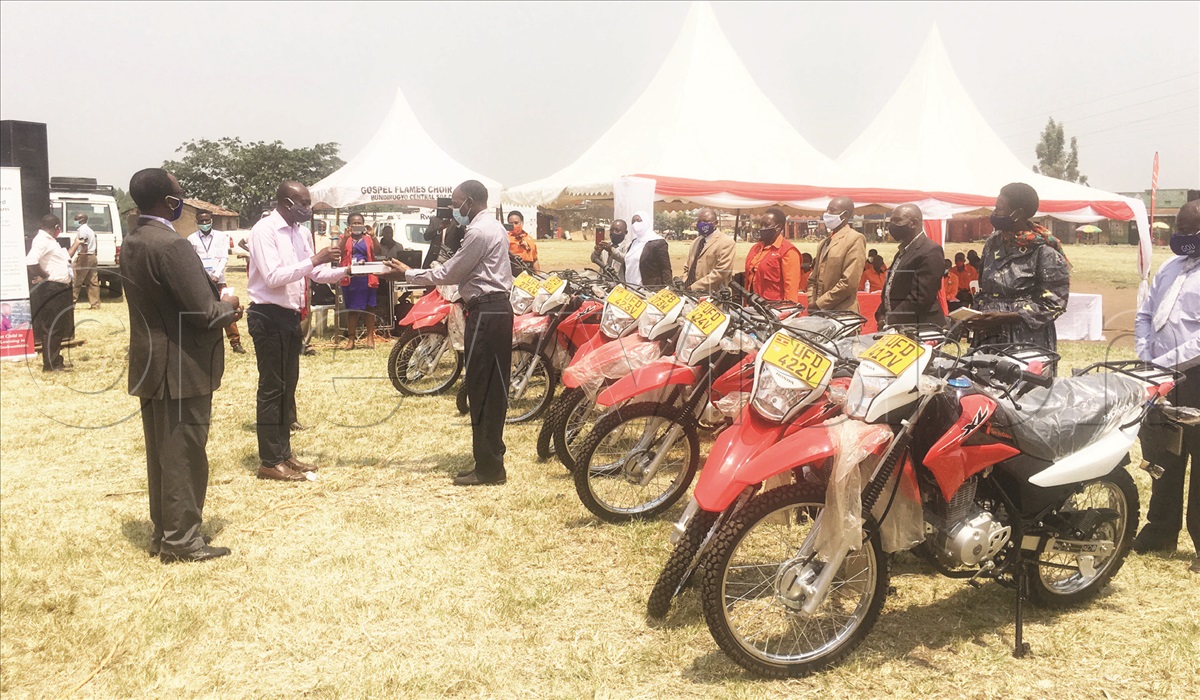This article was first published in the New Vision on May 5, 2021
By Jackie Achan
In the Rwenzori region, every dawn, teachers wake up to trek at least an hour or more up the mountains, to teach children in the highlands.
“Climbing the steep mountain, Monday to Friday is tedious,” the District Education Officer (DEO) for Bundibugyo, Justus Bithaghalire says.
“How much can such a teacher do to deliver quality education to a child after travelling 4km up the mountain? By the time the teacher gets to school they are too tired to teach. They have to rest for an hour before going into the classroom,” says Wilber Wanyama, from the department of teacher instructor education and training in the education ministry.
In the evening, the teacher has to walk down the same mountain for another hour or so to their home.
“Consequently, most teachers do not want to be posted to schools in the mountain,” Bithaghalire says.
Besides, “When a teacher visits the low lands and enjoys amenities (such as good roads, hospitals), they do not want to go back to the mountains. To have teachers stay up the mountain is diffi cult,” the DEO says.
Consequently, this has condemned the district that has 107 government schools, 53 schools in the mountains and several other private schools to poor education performance.
One way to resolve this, would be to provide staff accommodation at school, Wanyama says.
“If housing is availed, there will be a teacher in school to give children an opportunity at education,” he says.
However, a lack of accommodation is not the only challenge in the education sector the region faces, the lacklustre attitude of the teachers and head teachers is another hurdle.
“Headteachers play a significant role in determining whether there is learning in a school. However, we have been to many schools where teachers report as they wish and do not prepare for lessons. Even when they are in school, they are not teaching and their headteachers do not tackle this issue,” Wanyama says
Improving Learning Through Teacher Development
Teachers play a significant role in ensuring that children learn, says Wanyama. He adds that education is the single most important resource that any country that is to develop, can anchor on to realise its development.
“The Government White Paper 1992 says no country is better than the quality of its education and there is no education system that is better than the quality of its teachers.”
Wanyama adds: “Uganda is dreaming of attaining a middle income status and there is no way we can achieve that as a country without focusing on quality education. In addition, Uganda subscribes to the Sustainable Development Goals (SDGs) particularly SDG4 which focuses on providing equitable quality inclusive education to all children and promoting lifelong learning.”
In that regard, for the Rwenzori region, to deliver quality education, Save the Children Uganda, has launched a teacher professional development project in the Kasese Ntoroko and Bundibugyo districts.
The organisation has donated 10 motorcycles, tablets and desktop computers to Centre Co-ordinating Tutors (CCTs) at Primary Teachers Colleges. The equipment will be used to support headteachers to ensure quality learning.
At least 209 teachers in each of the three districts are to benefit from the teacher professional development project, says Bithaghalire.
The CCTs will use the motorcycles to ride to the hard-to-reach schools to support headteachers and teachers in improving the quality of education in the highlands.
“Some headteachers have not been supervising teachers,” says Yofesi Kule, a Centre Co-ordinating Tutor at Canon Apollo Core PTC in charge of Kisinga in Kasese district.
He says the support of the CCTs to headteachers includes reminding them of their roles and ensuring they emphasise regular attendance of teachers.
Also, being emphasised is teachers making proper schemes of work and lesson plans.
“We follow them up so that they are able to properly interpret the curriculum and manage the timetable,” Kule says.
The headteacher of Kahendo Primary School in Kasese district, Lydia Nyakato, agrees most teachers were not adhering to their professional ethics.
“I don’t know if they are demoralised, but they were lax. I hope with the support, there will be an improvement in learning outcomes.”

For the teacher to teach and follow the timetable effectively, the headteacher must give proper guidance.
“It is shameful. Headteachers are the custodians of children’s learning. They are the first-line supervisors. As you receive this support, it will be an embarrassment to the ministry to see that you have misused and abused the support. Let it translate into improved learning for the children,” Wanyama says.
He added that: “CCTs have a huge task of improving learning in the region. However, the fact that you have committed to be part of this programme, means you accept to leave your motorbike where it can stop and climb the highlands to reach schools in the mountain.”
“The system will be strengthened permanently and that teachers will be in a better place in terms of owning their own professional development continuing with it and deliver quality education for all the children in all the schools that we reach,” Brechtje Van Lith, the country director, Save the Children Uganda said.

